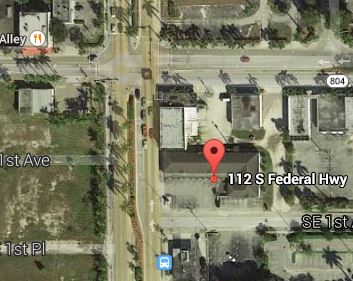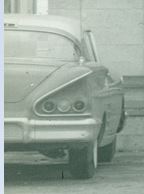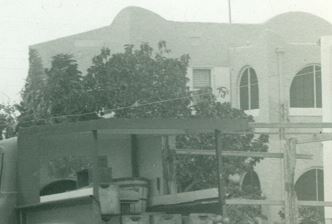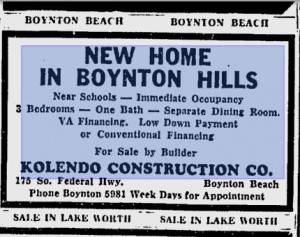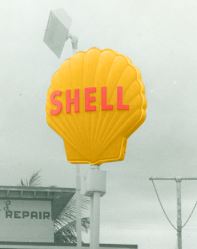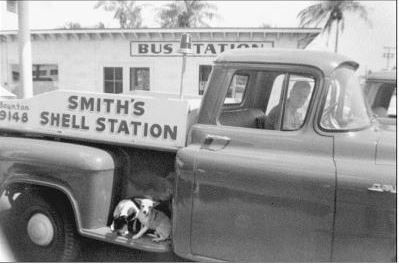Last week an envelope of late 1950s/early 1960s photographs arrived in our mailbox. The lovely 8″ by 10″ photographs were taken by popular lens man Stan Sheets. While Mr. Sheets took photographs for the Boynton Star, the Palm Beach Post and other local newspapers, he also captured street scenes of mid twentieth century Boynton Beach. His foresight to photograph everyday street scenes and share his images with friends and neighbors (in this case friend Charles Cassell), allows us to look back and see the charm of our town a half century ago.
Most of the photographs are not labeled, but careful scrutiny of the foreground, background, and other details give clues to the place and the date of the images, now frozen in time.
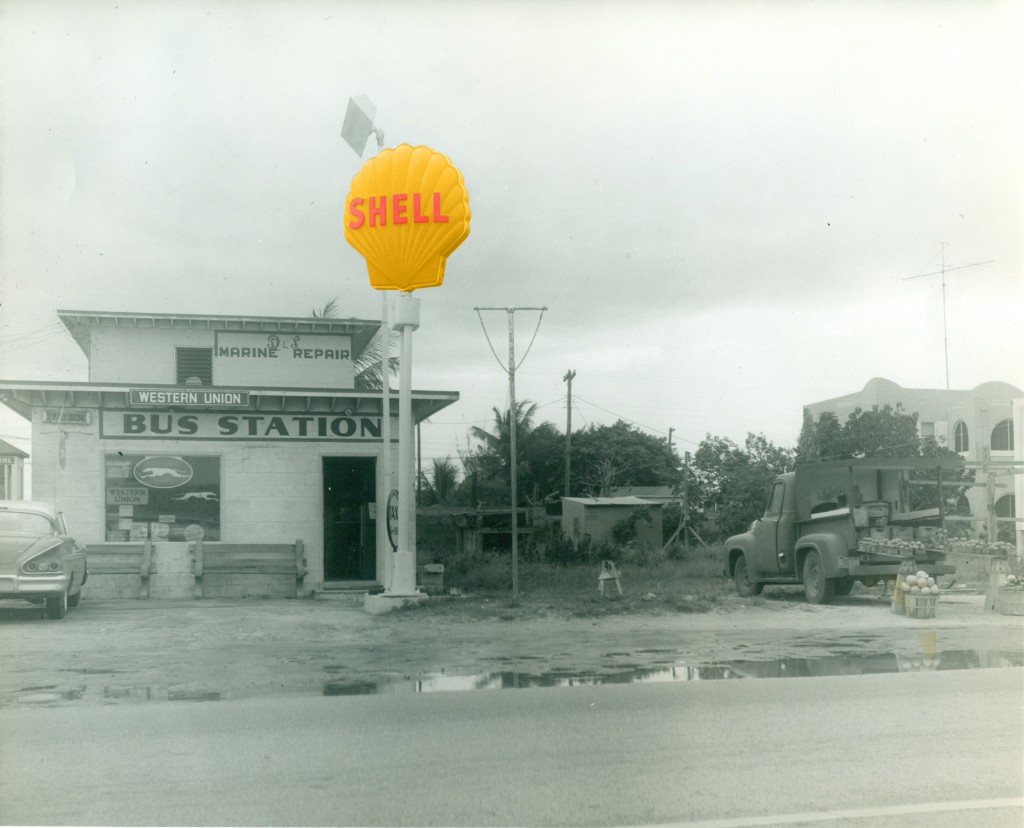
Photograph of Boynton Greyhound Lines Bus Station by Stan Sheets. Donated by Faith Cyr. Colorized by Ginger Pedersen.
My favorite photograph is of the Greyhound Lines Bus Station. According to the 1959 Polk City Directory the bus station was located at 112 S. Federal Highway on the east side of Federal Highway about a block south of Ocean Avenue. What I find most amazing about this image is the details it captures.
Look closely, and you will see that not only did this structure serve as the bus terminal; it played an important role in communication and transportation, two vital components of our town’s infrastructure.
Note the two benches outside the station, for waiting for the bus. Imagine how many people rested there over the years, perhaps to leave for college in Tallahassee or visit relatives in the north. Picture the moms and dads tearfully waving white handkerchiefs as the buses pulled away. The station had a Western Union Telegraph Office, where you could send a telegram announcing you had arrived. “ARRIVED IN BOYNTON SAFELY STOP MISS YOU ALREADY STOP LOVE PATSY”
The telephone number for the local taxicab (9694) is displayed outside the station, and I spy a telephone booth in the far left of the frame, behind the 1958 Chevy Impala.
Try peering into the open door. Barely visible inside is an old Coca Cola machine. The 6 oz. bottles of Coke from the vending machine likely cost 10 cents by 1960. The empty bottles fetched a 2-cent return value. The bus station probably sold many of those 10-cent cokes in the summer, as the station had no air conditioning. The structure had jalousie windows and the door is open to let in a breath of air.
The house to the right of the frame once belonged to the Kolendo family. Joseph Kolendo, a building developer, was responsible for developing many of the single-family homes in Boynton in the 1950s.
The house has a huge television antenna. Those were the days before cable TV, satellite dishes, or WiFi. The television was likely a black and white console with only a few TV stations reached by dial, probably WTHS, channel 2,WJNO, channel 5, WEAT, channel 12, WIRK, channel 21.
What is curious about the photo is the roadside citrus stand. An old pickup truck with a makeshift stand is peddling grapefruit and oranges.
Behind the truck are several lean-to’s or storage sheds with an assortment of old junkyard type objects lying about.
I spy a child’s old rusted tricycle on top of the haphazard pile. I guess the city didn’t have code enforcement in those days.
(Update: Wayne Kolendo tells us the small building with the tricyle, bike wheels and other items housed his bicycle repair/building shop. Kolendo was a mechanical entrepreneur during his high school years.).
While no gas pumps are visible, one can’t miss the iconic yellow and red Shell Oil Company sign with the 1955 emblem. Using modern day magic, the original photograph by Stan Sheets is again glowing brightly.
Next time you come across some old pictures, send them to us. You might see some of them featured here!
*If any readers know Mr. Sheets, please let him know we are interested in talking to him, and thanking him for capturing and preserving our history.
(8/21/14 update) We learned Stan Sheets left us in 2005. We are working with his family to honor him for his community support and for chronicling Boynton history.
We also found another photo of the bus station/Shell Station.
Special thanks to:
- Faith Cyr
- Wendy Smith Franklin
- Debra Kolendo
- Ginger Pedersen
- Stan Sheets
- Historic Boynton Beach Facebook Fans
References for this story:
- Car Gurus. http://www.cargurus.com/Cars/1958-Chevrolet-Impala-Pictures-c4308
- Florida Television History. http://rogersimmons.com/florida-television-history/
- GoogleMaps. https://www.google.com/#q=112+S+Federal+Hwy%2C+Boynton+Beach%2C+FL
- Palm Beach Post
- Polk City Directory
- Shell Oil Company. http://www.shell.com/global/aboutshell/who-we-are/our-history/history-of-pecten.html
- History of Coca Cola. http://www.worldofcoca-cola.com/coca-cola-facts/coca-cola-history/

